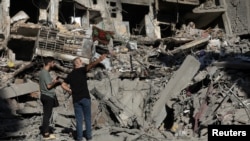JERUSALEM — Israel’s military continued strikes on Hezbollah targets in Lebanon Sunday and announced the death of another high-ranking official with the Iran-backed militant group, days after Israel killed long-time Hezbollah leader Hassan Nasrallah.
Israel’s army Sunday said a strike killed Nabil Kaouk, the deputy head of Hezbollah’s Central Council on Saturday. A day earlier, Hezbollah confirmed that an Israeli strike in Beirut Friday killed Nasrallah.
Amid the Israeli strikes, thousands of Lebanese continued to flee their homes with the Lebanese government saying that around 250,000 Lebanese are in shelters and up to 100,000 are staying with friends or relatives.
Israelis have overwhelmingly welcomed the assassination of Nasrallah, who led Hezbollah attacks on Israel for more than three decades. Israeli press reports said the operation had been planned for more than a decade and Israeli Prime Minister Benjamin Netanyahu called him an “arch-terrorist.”
“The state of Israel eliminated the arch-murderer Hassan Nasrallah. We have settled accounts with someone who was responsible for the murders of countless Israelis, and many nationals of other countries including hundreds of Americans,” he said Saturday.
Asked about the recent events in the region, White House national security spokesperson John Kirby told ABC’s This Week that “Israel has a right and a responsibility to eliminate this threat to their people and to their land.”
“At the same time, we believe that we do need to look for ways to deescalate the tensions,” he added.
Along with Nasrallah and other Hezbollah leaders, Israel killed the deputy commander of Iran’s Islamic Revolutionary Guard Corps. Iran’s foreign minister said Nasrallah’s death “will not go unanswered,” and Tehran declared five days of mourning for him.
Israeli analysts say they expect some kind of response to the killing of Nasrallah, but it could also be directed at Israeli or Jewish targets abroad.
Colonel Miri Eisen, the director of the International Institute for Counter Terrorism in Isael and an expert on Hezbollah, mentions the Iran-backed Hezbollah attack on the Israeli Embassy in Buenos Aires in 1992 that killed 29 people as an example.
“I don’t know what Iran will do. I absolutely think they will respond, absolutely. I think they will use, as Hezbollah by the way will use, they will use the forces they have built, some of them jointly, the Al-Quds Iranian Revolutionary Guard force. I think that they will respond in the world,” she said.
Israel has called on Israelis abroad to exercise caution and stepped up security around Israeli embassies.
But Eisen says that even without Nasrallah and the senior leadership that has been killed, Hezbollah still presents a serious threat to Israel.
“This isn’t about eliminating, it’s not a knockout. This isn’t the end of the game and Hezbollah was in it for the long term. In the immediate sense, it’s not elimination but also that Israel still has militarily immediate threats that are continually being taken care of still with Hassan Nasrallah not around,” she said.
Israel says it continues to maintain the same goals – to weaken Hezbollah so that the 63,000 Israelis who were forced to leave their homes amid Hezbollah rocket attacks near the Lebanese border can go home, and to free the 101 Israeli hostages whom Hamas continues to hold in Gaza.
Hezbollah broke a relative calm along the border after Hamas’ October 7 terror attack on Israel triggered the war in Gaza. Israel says Hezbollah has fired nearly 9,000 rockets at communities in northern Israel since then. The militant group says it is acting in solidarity with Palestinians and its fellow Iran-backed ally, Hamas. The fighting has killed 49 people in Israel, along with hundreds in Lebanon, and displaced tens of thousands on both sides of the border.
Hamas has been designated a terror group by the United States, United Kingdom, European Union and others. Hezbollah also is a U.S.-designated terror group.





Forum